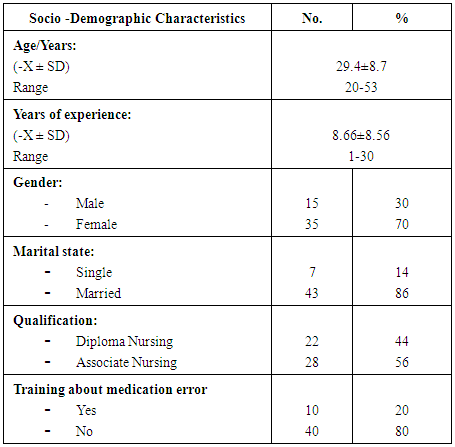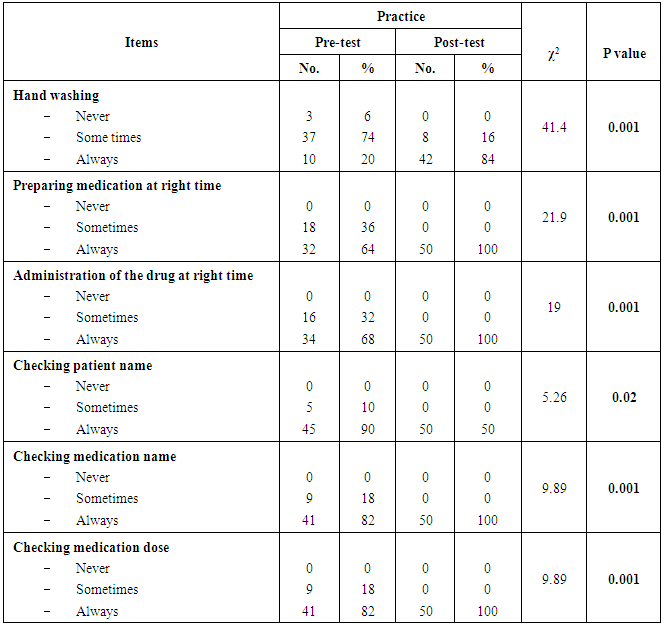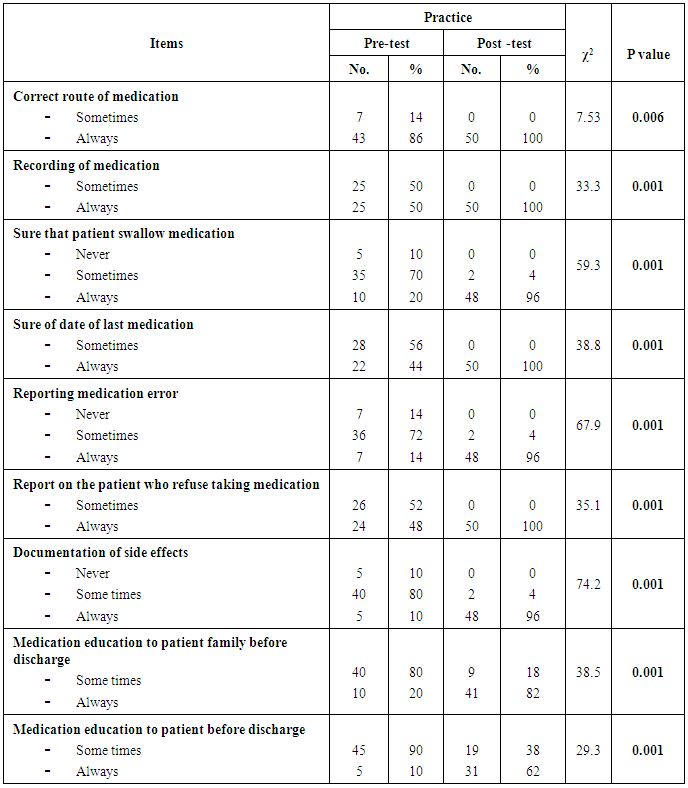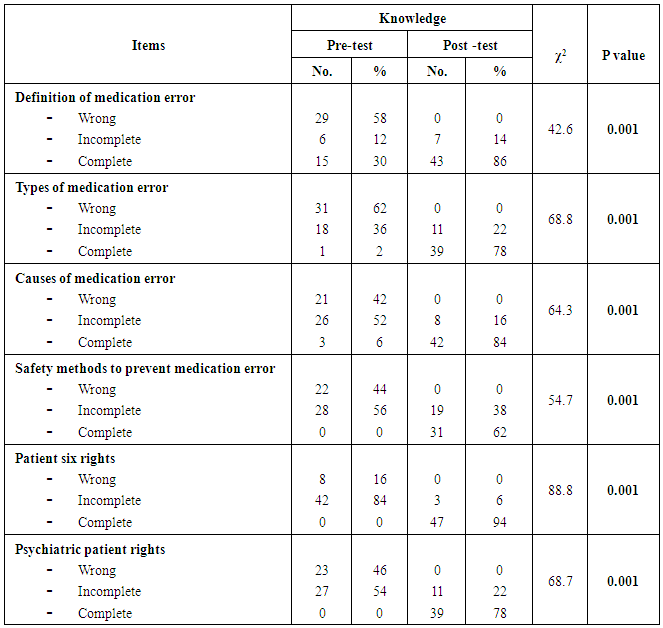-
Paper Information
- Paper Submission
-
Journal Information
- About This Journal
- Editorial Board
- Current Issue
- Archive
- Author Guidelines
- Contact Us
International Journal of Nursing Science
p-ISSN: 2167-7441 e-ISSN: 2167-745X
2016; 6(4): 94-102
doi:10.5923/j.nursing.20160604.02

Impact of Nursing Intervention Regarding Medications Errors on the Level of Psychiatric Nurses' Practice
Sabah M. Ebrahem , Mona A. Elnagar
Psychiatric Nursing, Menoufia University, Egypt
Correspondence to: Sabah M. Ebrahem , Psychiatric Nursing, Menoufia University, Egypt.
| Email: |  |
Copyright © 2016 Scientific & Academic Publishing. All Rights Reserved.
This work is licensed under the Creative Commons Attribution International License (CC BY).
http://creativecommons.org/licenses/by/4.0/

Medication errors in mental health could have severe consequences. Aim: The aim of the study was to evaluate the impact of nursing intervention regarding medications errors on the level of psychiatric nurses' practice. Design: Quasi-experimental design (one group pretest - posttest) was used. Setting: The study was conducted at The Psychiatric and Addiction Treatment Hospital in Mit-Khalf at Menoufia, Egypt. Sample: A convenience sample of 50 registered nurses from the previously mentioned setting were recruited. Data collection: A constructive interviewing questionnaire was used for this study consisted of three parts, part one was to assess socio-demographic data, part two was to assess the nurse’s knowledge related medication errors and Part three was to assess the nurses' practice. Results: The study illustrated that there was a statistically significant improvement in nurse’s knowledge and practice post implementation of the nursing intervention than pre - intervention. Conclusions: the nursing intervention was effective in improvement of the nurses’ knowledge and practice which lead to prevention of medication errors. Recommendations: Standardized program relevant to different aspects of psychiatric nursing in order to cover most of the nurses' educational needs should be developed. The nursing intervention should provide the psychiatric nurses, with accurate information needed to achieve optimal knowledge, practice and promote patient safety.
Keywords: Medication error, Psychiatric nurses, Practice
Cite this paper: Sabah M. Ebrahem , Mona A. Elnagar , Impact of Nursing Intervention Regarding Medications Errors on the Level of Psychiatric Nurses' Practice, International Journal of Nursing Science, Vol. 6 No. 4, 2016, pp. 94-102. doi: 10.5923/j.nursing.20160604.02.
Article Outline
1. Introduction
- Recent years the biological treatment of psychiatric disorders has improved. "Many new psychiatric medications have been developed; some of which have proved to be highly effective. As a result, most of the psychiatric disorders can now be treated much more effectively than a decade ago. These new medications have lower side-effects than the older drugs, the risk for medication errors (MEs) and adverse drug events (ADEs) continues to be an important problem" [1].Medication Error (ME) is defined as "any preventable error that may cause or lead to inappropriate medication use or patient harm while the medication is in the control of health-care professional, patient or consumer" [2]. Medication errors in psychiatric inpatients occur at similar rates as in adults but have three times the potential to cause harm. "The nurses have the central role in the medication administration process. It is an everyday part of nursing practice and is so much more than a simple psychomotor task and involves a multidisciplinary team that also consists of the physician, pharmacist, and patient" [3, 4].Medication errors can be prescription errors, dispensing, administration, monitoring, potential, compliance and clerical errors. Medication errors may include health-care professionals' factors, patient's related factors, and provider - related factors. The health-care professional's factors include miscommunication between the health-care team, confusing or misleading drug-labeling, packaging, nomenclature of medicines, lack of knowledge about drug therapy, misinterpretation of verbal orders, incomplete patient history for example ignorance of taking the allergy history of the patient [5]. Patient -related factors include noncompliance to medication, failure of the patient to give accurate information about their medications and symptoms of psychiatric illness etc. Provider related factors may include clinical practices associated with prescribing, transcription, dispensing, and administration and monitoring [6].In medication administration process it is very important to study the behavior of the psychiatric nurses. When nurses perform mal-behavior on medication administration, it is said to be non-compliance, in turn, neglect of conduct, resulting in medication administration errors (MAE) probably. [7]. All clinicians who prescribe or administer medicines are accountable for the care that they give and are responsible for undertaking a comprehensive assessment of the patient; ensuring that the medicine they are administering is valid, identify the current antipsychotic medications of the patient to ensure that medications are not contraindicated. Also, the nurse should be aware of unwanted side effects of the medication and what unwanted symptoms might emerge [8]. The Psychiatric nurse plays an important role and requires special knowledge and skills, concerning the proper care throughout the medication administration process [9, 10]. Therefore, the objective of this study was to evaluate the impact of nursing intervention on the level of psychiatric nurses' practice.
2. Significance of the Study
- "Medication is one of the main treatments for people with mental health problems and good quality primary care is increasingly vital in the health care of people with the severe mental illness. Medication errors, one of the most frequent clinical errors, are estimated to cause 7000 deaths every year in the USA and occur in between 2% and 15% of UK hospital admissions. Medication errors are associated with significant costs and morbidity 1–2% of hospital inpatients are harmed by a medication error. The adverse consequences of error within healthcare are becoming increasingly apparent and improving patient safety is a key policy within health services across the world" [11]. "Medication error in psychiatry is a neglected aspect of research and recognized as an important quality and patient safety problem in modern hospital settings, causing harm as well as avoidable morbidity and mortality" [13]. "There is limited evidence about these issues in psychiatric settings, only a few studies on adverse drug events and medication errors in psychiatric hospital settings exist, four of these studies addressed prescribing errors and two studies addressed administration errors "[9, 13].
3. Methodology
3.1. The Aim of the Study
- The aim the study was to evaluate the impact of nursing intervention on the level of psychiatric nurses' practice.
3.2. Research Hypothesis
- The nursing intervention may have a significant effect on the level of psychiatric nurses' practice.
3.3. Research Design
- - Quasi-experimental design (one group pre test post test design) was used to achieve the purpose of the study.
3.4. Research Setting
- - The study was conducted at The Psychiatric and Addiction Treatment Hospital in Mit-Khalf at Menoufia, Egypt.
3.5. Subjects
- - A convenience sample of 50 registered nurses who were working in the psychiatric units from the above - mentioned setting during the period of the study was selected. Sample was selected according to the following criteria: nurses who form all level and who were agreeing to participate in the study.
3.6. Instrument of the Study
- The instrument consisted of the following:-1- A constructive interviewing questionnaire (Pre/Posttest) was developed by the researcher in an Arabic language and tested for its content validity by a panel of expertise. It consists of three parts:Part one: - a questionnaire to assess socio-demographic data of studied nurses as age, qualifications, job title, years of experience, previous training in medication administration field.Part two: - a questionnaire to assess the nurse’s knowledge related medication errors. It consists of 6 questions, regarding definition of medication error, types of medication error, causes of medication error, safety methods to prevent medication error, six rights of medication, psychiatric patient rights. -The responses of the nurses were scored from zero to 2 scores to assess the level of general knowledge about medication errors. Score zero for the wrong answer, (1) score for the incomplete answer and (2) score for the right answer. -The total scores for general knowledge of the nurses about medication errors and safety methods to prevent medication errors was determined by stratifying level of general knowledge of nurses into three categories: poor knowledge from 0 to less than 6 scores, good knowledge from 6 - to less than 8 scores and high knowledge from 8 - to 12.Part three: - a questionnaire to assess the nurse’s practice. It consists of 15 items, regarding to safety medication administration and prevention the medication errors, through asking questions as regard hand washing, medication preparation before distribution, medication distribution at correct time, correct reading of the patient's name, correct reading of the medication name, correct reading of the medication dose, correct route of the medication, recording medication before distribution, sure that the patient swallow the medication, sure of date of last medication, reporting medication errors, report on the patient who refuse taking the medication, documentation of medication side effects, medication education to the patient's family before discharge, medication education to the patient before discharge. The responses of the nurses were scored from one to 3 scores to assess the level of the nurse’s practice. Within each item is rated from 1 to 3. (one refers to never, two refers to sometimes and three refers to always). The total scores for the nurse’s practice was determined by categorizing the level of the nurse’s practice of nurses into three categories low practice from zero to less than 16, good practice from 16 to less than 24 and high practice from 24 to 45.
4. Procedure of Data Collection
- - Administrative approval: An official approval was obtained from the director of The Psychiatric and Addiction Treatment Hospital in Mit-Khalf.- Ethical consideration: The nurses were briefed about the study, encouraged to participate and motivated to express their experiences. The nurses give fully informed verbal consent to participate. It was emphasized that all data collected was strictly confidential and the data would be used for scientific purposes only.- Validity: The tools of data collection were tested for its content validity by a panel of experts in psychiatric nursing staff to ascertain relevance and completeness and the required modification was carried out accordingly.- Reliability: The reliability of the tools for the study was done using test - retest reliability and the two tools proved to be strongly reliable at 0.80 for tool one and at .85 for tool two.- Pilot study: Pilot study was carried out during December 2015. It involved ten percent of the total sample to test the applicability of the study tools and to determine the time needed to fill in the questioner. Those involved in the pilot study were excluded from the main study sample.- Data collection: Data collection for this study was carried out in the period from January 2016 to March 2016. The researcher collected the data during the morning at two days/week from 10 AM to 12 PM., the subjects were divided into 6 groups; each of them consisted of 8 to 9 nurses (each group took four sessions). Each session lasted for 45-60 minutes, depending on the response of nurses. The implementation of the study passed into three phases (pre - assessment phase, implementation phase, and post - assessment phase). - Pre-assessment Phase: A comfortable, private place was chosen for the interviewers. Orientation was done about the purpose of the study and content of the study. Each nurse was individually interviewed where pre - assessment was done using structured interviewing questionnaire to identify and determine the weak points of the nurses’ knowledge, practice toward medication errors. - Implementation Phase: This study hypothesized nursing intervention will improve nurses’ knowledge and practice than before the intervention. Nursing intervention divided into 4 sessions. Each session lasted for one hour and has a set of specific objectives. This was achieved through several teaching methods as brainstorming, lecture, group discussion; role playing, data show, picture, posters, and booklet were used as media. At the end of each session summary, feedback, further clarification was done for vague items and homework activity for the following session. Content of the nursing intervention session:-Short description of the intervention program sessions employed in the study is discussed belowSession 1: involved developing a trusting relationship with the nurses and encouraging them to discuss their opinion, expectations, specific needs and problems regarding psychiatric medication errors.Session 2: concerned with knowledge about, definition of medication errors, causes of medications errors in psychiatric department, types of medications errors.Session 3: concerned with prevention of medication errors, psychiatric patient rights, and psychiatric nurse responsibilities toward the patient and his family.Session 4: Summary of all previous sessions. Post - assessment phase: Evaluation was done using the interviewing questionnaire to assess the nurse’s knowledge and the level of the nurse’s practice (post test).
5. Data Processing and Analysis
- Data was analyzed using SPSS (Statistical Package for Social Sciences) version 16. In categorical data Chi-squared test was used for comparison between groups. Odds ratio and 95% confidence interval were calculated. Pearson’s correlation was used to show the relation between quantitative variables. And, Spearman correlation test was calculated to test the association between two variables (quantitative and qualitative). P<0.05 was considered statistically significant. Parametric tests were one away ANOVA (F test).
6. Limitation of the Study
- Many of the nurses were too overloaded with work, and there were many interruptions during the time of answering of questionnaires. Many nurses did not participate in the study because they did not want to evaluate their practice. There were limited literature and the high percentage of the reviewed literature was very old references.
7. Results
- Table (1): Demonstrates that the minimum age of the sample is 20 and the maximum age is 53, the mean age is 29.4(SD =8.7), 70% of the nurses are female; the majority of the nurses are married (86%). IN relation to qualification more than half are associate nursing, and the majority of the sample doesn't take training about medication errors (80%).
|
|
|
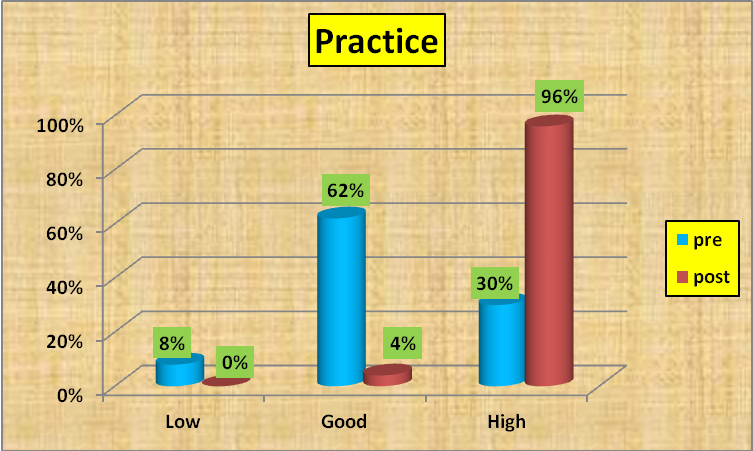 | Figure (1). Total practice scores of the nurses' pre and post the nursing intervention |
|
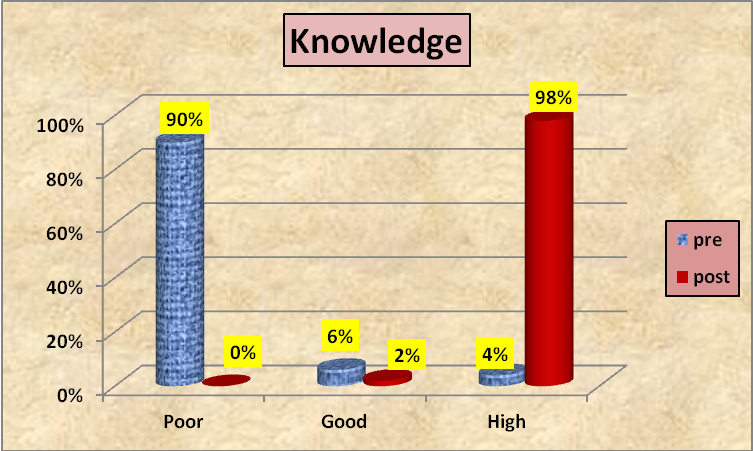 | Figure (2). Total knowledge scores of the nurses' pre and post the nursing intervention |
8. Discussion
- "Patient safety is the main goal of the healthcare delivery system" [14]. "Psychiatric units may be associated with different rates and types of medication errors because of differences associated with psychiatric patients, psychopharmacologic agents, and the psychiatric inpatient setting. Psychiatric patients may have lower abilities to report prior drug allergies or side effects of the drugs with respect to their longer lengths of stay. Psychopharmacologic agents for psychiatric inpatients may be associated with increased risks for errors" [15]. "Characteristics of the psychiatric inpatient setting may differ, as compared with general medical–surgical units, include lower ratios of nursing staff to patient, greater physician expertise in the use of psychotropic agents but possibly less knowledge concerning other medication classes, different nursing processes for patient monitoring and other systems-related factors" [16]. Therefore, the aim of this study was to evaluate the impact of the nursing intervention on the level of psychiatric nurses' practice.Regarding impact of the nursing intervention on the nurses' practice the present study indicated that there was a highly statistically significant difference between pre and post test toward all tested items of psychiatric nurses' practice which lead to prevention of medication errors, also revealed that only about one - third of the studied nurses had high level of practice before the nursing intervention compared to the majority after the nursing intervention. This result could be due to the majority of the studied nurses had poor knowledge about psychiatric disorders and safety methods of medication administration and documentation process, also most of them don't study psychiatric nursing in details in the school of nursing and had no experience at the psychiatric hospital before. This finding was in correspondence with Elbahnasawy, et al who studied "Guideline Model for Nurses to Prevent the Medication Errors and Adverse Drug Events in Pediatric Inpatients" done at Egypt. They reported that "There was a statistical significant difference regarding nurses practice pre and post implementation of the guideline model specifically correct reading the order, review patient six rights and double check of medications which lead to prevention of medication errors" [17]. In contrast to Bafghi., et al, who studied "Investigation the relationship between the amount and type of medication errors with fatigue in nurses ". They indicated "a significant relationship between work experiences of nurses with medication errors exist. Although the incidence of medication errors decreased with increasing experience, but the difference is not statistically significant" [18].The current study indicated that the majority of the nurses have poor knowledge about medication errors and safety measures to prevent medication errors before the nursing intervention. This result may be due to the majority of the studied nurses not trained in medication errors, safety methods to prevent medication errors and poor security of knowledge transfer from senior to junior nurses. In contrast to Johar., et al who studied " Medication Errors Among Nurses in Government Hospital", They illustrated that "the level of knowledge of nurses regarding administering medication were more than half of the nurses (54%) had medium, 46% high, while none had low scores" [19]. Also, Castledine who studied " Staff nurse removed from the nursing register for mismanagement of drug rounds ", He revealed that "72% respondents had average or above average basic knowledge regarding medication errors" [20]. Preston who studied "Drug errors and patient safety: the need for a change in practice "He addressed that " The key causes of medications administration errors on nurses were poor calculation competency, poor adherence to protocol, poor knowledge about medications "[21].Regarding the nurses' knowledge, the current study revealed that the majority of the nurses had poor knowledge in the pre-test and the majority of them had high knowledge in the post-test. That indicated the effectiveness of the nursing intervention on improving nurse's knowledge post intervention. This result was in agreement with Sewal, et al. who studied" A prospective study to evaluate awareness about medication errors amongst health-care personnel " They reported that "The medication safety training program for nurses knowledge scores improved in pre-post test study" [22]. This may be due to the medication errors and safety measures to prevent medication errors in psychiatric hospitals not included in the psychiatric curriculum in nursing schools. Also, the present study showed that nurses’ knowledge was improved significantly in the post -test regarding definition, types, and causes, safety methods to prevent medication errors, patient six rights, and psychiatric patient rights. This result congruent with, Papastrat, and Wallace who studied "Teaching baccalaureate nursing students to prevent medication errors using a problem-based learning approach" They reported that "lack of proper training, was predominant among the system related factors leading to medication errors, reason being, nurses who were still in the training phase were assigned with the duty of administering drugs to the patients, lack of sufficient nursing staff was the next system related factors that lead to medication error, and only single nurse is assigned with the duty of administering drugs to every 10 patients" [23]. Regarding the nurses' practice, the current study revealed that the majority of the nurses had high practice post the nursing intervention. That indicates the effectiveness of the nursing intervention on improving nurse's practice post intervention. This result was in agreement with Schneider et al, who studied "Improving the safety of medication administration using an interactive CD-ROM program". They illustrated that "After the training, nurses’ use of safe administration practices increased, but preparation errors did not decrease" [24]. This result may be due to medication in the studied psychiatric inpatients units most of the times tablets or injection and most observed medication error were administrating errors because the nurses not applying the patient six rights, document medication before distributions and didn't ensure that the patient swallows medication and didn't give health education to the patient and his family before discharge about medication. All of these errors due to lack of the knowledge, once the knowledge improved their practice improved.
9. Conclusions
- It can be concluded from this study that the nursing intervention was effective in improvement of the nurses’ knowledge and practice which lead to prevention of medication errors.
10. Recommendations
- Standardized program relevant to different aspects of psychiatric nursing in order to cover most of the nurses' educational needs should be developed. The nursing intervention can provide the psychiatric nurses with accurate information needed to achieve optimal knowledge, practice and promote patient safety.
 Abstract
Abstract Reference
Reference Full-Text PDF
Full-Text PDF Full-text HTML
Full-text HTML